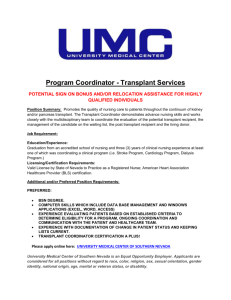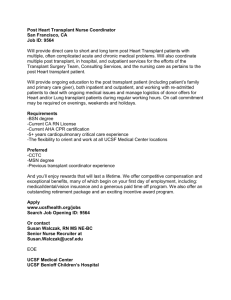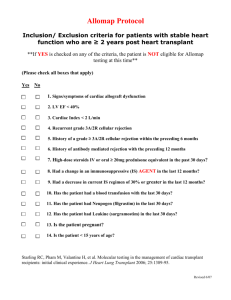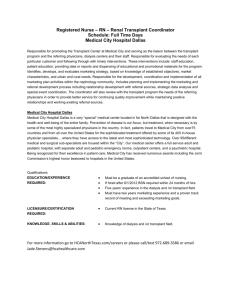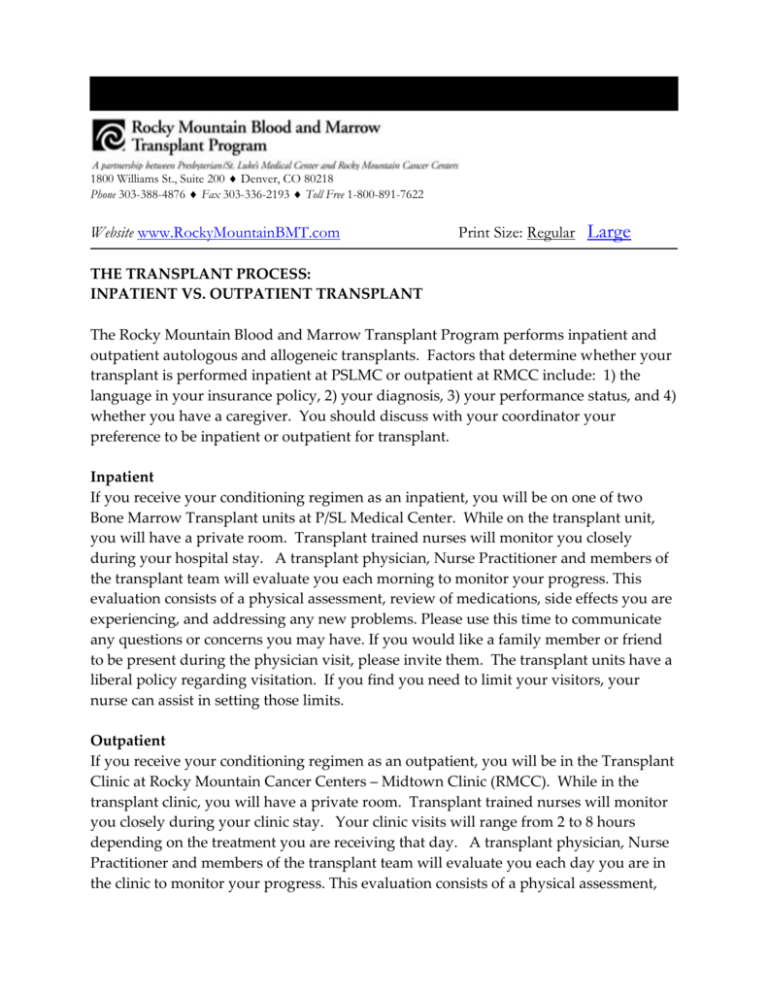
1800 Williams St., Suite 200 Denver, CO 80218
Phone 303-388-4876 Fax 303-336-2193 Toll Free 1-800-891-7622
Website www.RockyMountainBMT.com
Print Size: Regular
Large
THE TRANSPLANT PROCESS:
INPATIENT VS. OUTPATIENT TRANSPLANT
The Rocky Mountain Blood and Marrow Transplant Program performs inpatient and
outpatient autologous and allogeneic transplants. Factors that determine whether your
transplant is performed inpatient at PSLMC or outpatient at RMCC include: 1) the
language in your insurance policy, 2) your diagnosis, 3) your performance status, and 4)
whether you have a caregiver. You should discuss with your coordinator your
preference to be inpatient or outpatient for transplant.
Inpatient
If you receive your conditioning regimen as an inpatient, you will be on one of two
Bone Marrow Transplant units at P/SL Medical Center. While on the transplant unit,
you will have a private room. Transplant trained nurses will monitor you closely
during your hospital stay. A transplant physician, Nurse Practitioner and members of
the transplant team will evaluate you each morning to monitor your progress. This
evaluation consists of a physical assessment, review of medications, side effects you are
experiencing, and addressing any new problems. Please use this time to communicate
any questions or concerns you may have. If you would like a family member or friend
to be present during the physician visit, please invite them. The transplant units have a
liberal policy regarding visitation. If you find you need to limit your visitors, your
nurse can assist in setting those limits.
Outpatient
If you receive your conditioning regimen as an outpatient, you will be in the Transplant
Clinic at Rocky Mountain Cancer Centers – Midtown Clinic (RMCC). While in the
transplant clinic, you will have a private room. Transplant trained nurses will monitor
you closely during your clinic stay. Your clinic visits will range from 2 to 8 hours
depending on the treatment you are receiving that day. A transplant physician, Nurse
Practitioner and members of the transplant team will evaluate you each day you are in
the clinic to monitor your progress. This evaluation consists of a physical assessment,
Page 2 of 7
review of medications, side effects you are experiencing, and addressing any new
problems. Please use this time to communicate any questions or concerns you may
have. Your caregiver does not need to stay with you during your clinic visit. In fact, we
encourage them to utilize this time to run errands or take a needed break. Your
caregiver will need to meet with your nurse daily to provide information and receive
instructions regarding your care before you leave the clinic. You are not to drive
during the acute transplant period. Your physician will inform you when you are
medically cleared to drive.
CONDITIONING REGIMENS
Conditioning regimens are high dose or reduced intensity and consist of a combination
of chemotherapy, radiation and/or immunosuppressive agents.
High-Dose/Myeloablative Regimens
The purpose of high-dose regimens is to destroy a greater number of cancer cells than
with standard doses of chemo/radiotherapy.
• High-Dose Chemotherapy
There are several chemotherapy drugs that can be utilized. Chemotherapy regimens
vary depending on the type of cancer, the stage of the cancer, and the available
chemotherapy protocols. Your physician will discuss the best drugs and doses for your
disease.
• Total Body Irradiation
In addition to chemotherapy, some patients also receive Total Body Irradiation (TBI) as
part of their preparation for transplant. TBI is given in divided doses, called fractions, at
the Radiation Oncology Department. The number of fractions you receive will depend
on your treatment guideline or protocol. Each visit takes 1-1.5 hours. You will meet
with the Radiation Oncologist and the Radiation Physicist prior to being admitted for
your transplant.
Non-Myeloablative Regimens/Reduced Intensity
The purpose of non-myeloablative or reduced intensity regimens is to create space in
the patient’s marrow for donor cells. These regimens can accomplish this goal by
giving lower doses of chemotherapy and/or radiation in conjunction with
immunosuppressive agents.
Revised January 2005, Fifth Edition, Rocky Mountain Blood and Marrow Transplant Program. All rights reserved.
Page 3 of 7
• Chemotherapy/TBI
Standard doses of chemotherapy with or without 1 –2 fractions of TBI are administered.
These regimens vary depending on the type of cancer, the stage of the cancer, and the
available protocols. Your physician will discuss the best drugs and doses for your
disease.
STEM CELL TRANSPLANT
When you have completed your conditioning regimen, your own or donated stem cells
will be given to you. A transplant physician, nurse practitioner, or nurse will perform
the transplant. The timing for re-infusion of stem cells varies from 0-3 days following
the completion of your conditioning regimen. A stem cell or bone marrow transplant
may sound dramatic, however the actual procedure is quite simple. The cells are
infused through your central venous catheter similar to a blood transfusion.
If the stem cells you are to receive were frozen, they will be thawed in a water bath
prior to re- infusion. Frozen cells are preserved in a substance called DMSO (Dimethyl
sulfoxide), which is used during the freezing process to prevent ice crystals from
damaging the stem cells. While these cells are infusing, you may notice a garlic-like
odor and taste. Sucking on hard candy may decrease this taste if you find it unpleasant.
A slight odor, which may be detected in your breath, urine, stool, saliva, and
perspiration, will be noticeable to those around you for one to two days after the
infusion. Other side effects of DMSO preserved stem cells may include chills, nausea,
fever, cough, flushing, headache, abdominal cramps, fullness, or diarrhea. Your nurse
will give you medications and will slow the rate of re-infusion to minimize these effects.
If you are receiving cells from a donor who had their cells collected on the day of your
transplant, the cells will be fresh, not frozen. Therefore, the symptoms related to the
DMSO are not experienced with the re-infusion of fresh stem cells.
Regardless of whether you received fresh or frozen stem cells you may notice that
your urine turns a reddish-burgundy color following the infusion. This is due to the
painless passing of red blood cells that may have been contained in the stem cell
product. Your urine will return to its normal color in one to two days.
POST-CONDITIONING
High-dose therapy can cause a variety of side effects as a result of destroying normal
cells in addition to cancer cells. Some of these side effects may be apparent during the
Revised January 2005, Fifth Edition, Rocky Mountain Blood and Marrow Transplant Program. All rights reserved.
Page 4 of 7
chemotherapy or immediately afterward, for example, hair loss, nausea, diarrhea, loss
of appetite, and fatigue. Other side effects may not occur until days, weeks, or even
months later.
Patients receiving reduced intensity regimens often feel well early in the post transplant
process. Side effects are minimal as the doses of chemo/radio therapy are significantly
lower than high dose regimens.
Graft versus host disease (GVHD) is a process that occurs in both high dose and
reduced intensity allogeneic transplants. GVHD is a process where the donor cells
recognize the host cells (the patient) as foreign. GVHD presents post-transplant when
the new immune system is gaining strength. The sites most likely to be affected by
GVHD prior to D +100 are the gut, skin, and liver.
ENGRAFTMENT
Your stem cells are expected to grow (engraft) and begin to produce blood cells two to
three weeks following your transplant. During engraftment, you may notice aching in
your bones, especially in your pelvis, lower back, and thighs. Your white blood cells
are the first to engraft followed by platelets, and then red blood cells. Autologous
patients usually engraft all three blood cell lines within 6 weeks post-transplant.
Allogeneic transplant patients may have delayed engraftment of platelets and red blood
cells for several months. This means you may continue to receive platelet and blood
transfusions even when you are discharged from the hospital.
PSYCHOSOCIAL
The Patient
There are many aspects about the transplant process that you may find stressful. The
treatment and side effects are physically and emotionally draining for patients. Fatigue,
nausea, pain and other unpleasant physical symptoms may worsen emotional
symptoms and vise versa. Be assured, the transplant doctors, nurses and psychologists
will closely monitor your symptoms and will intervene with medication or behavioral
tools as needed to control your discomfort.
Many emotional reactions are common during the transplant process, such as
depression, anxiety, fear, anger, guilt, relief and hope. It is normal to have a wide range
of feelings during transplant that may vary from day to day. Having someone to talk to
about feelings that come up during the transplant process is important so you are not
Revised January 2005, Fifth Edition, Rocky Mountain Blood and Marrow Transplant Program. All rights reserved.
Page 5 of 7
alone in dealing with these feelings. A transplant psychologist is available to provide
support in coping with feelings and issues that arise during the transplant process. We
all have ways of coping with stresses in our life; some are more effective than others.
The psychologist can help to identify and enhance coping resources that may be useful
during the transplant process. For example, relaxation and imagery techniques, taught
by the psychologist, can help in managing difficulties with sleep, anxiety, or discomfort.
The psychologist is also available for family meetings or to meet individually with
family members or children. Family meetings can be helpful to facilitate discussions
about issues that arise during the transplant process.
Symptoms of Depression
low mood, sad mood
feelings of worthlessness,
hopelessness, guilt
poor sleep (sleeping too much or
too little, early morning wakening)
loss or increase in appetite
irritable or easily annoyed
fatigue/loss of energy
loss of pleasure in life
withdrawal from others
crying easily
negative viewing of events
self-blame or self-criticism
thoughts of death
decreased concentration
indecision
loss of sexual drive
Symptoms of Anxiety
nervousness, excessive worry,
feelings of tension
fearful anticipation
poor concentration
difficulty with memory
irritability
restlessness, fidgeting, inability to
relax
sleep problems
difficulty completing tasks
changes in eating, drinking or
smoking habits
grinding teeth
tension headaches, muscle tension
choking feeling, difficulty
swallowing
queasy stomach, stomachache,
nausea, vomiting, loosening of
bowels, constipation, urinating
frequently
loss of interest in sex
tiredness
shakiness or tremors
weight gain or loss
awareness of heartbeat, rapid
Revised January 2005, Fifth Edition, Rocky Mountain Blood and Marrow Transplant Program. All rights reserved.
Page 6 of 7
heartbeat
dry mouth
sweating
A common feeling for patients going through transplant is a loss of control. Giving up
your own routine and independence can be frustrating, and relying on others to care for
you can be difficult. We encourage you to retain as much control as possible, including
making decisions for yourself, being informed, and getting your questions answered.
You should continue to be independent with aspects of your daily care that are
important to you.
Realistic expectations are important through the transplant process. When we set
expectations we cannot meet or have inaccurate perceptions of what to expect from
transplant and recovery, it adds to the stress of the process. Symptoms of anxiety and
depression are more common when expectations are not met. So, for example, if you
tell yourself you will be back to work in one month even though the doctor is telling
you three months, and at one month you are unable to return to work because you are
too tired, you are more likely to be disappointed and have that affect your mood. Thus,
it is important to set realistic goals and discuss questions, concerns and uncertainties
with your transplant physician or team so you can obtain accurate information and
clarify misconceptions.
The Caregiver
The transplant process is difficult for caregivers as well as the patient. Caregivers or
family members may experience many of the stresses and feelings that patients
experience. In addition, the transplant process places stress on family and marital
relationships. Often, when patients are not feeling well, they are more irritable and
they can direct that irritability at family members who are their supports. Being the
“punching bag” can be difficult when you are already picking up extra duties due to the
patient’s illness. It is important for family members to seek support for themselves
going through this process. There is a weekly support group for caregivers of transplant
patients at Presbyterian/St. Luke’s Medical Center that provides an opportunity for
caregivers and family members to meet each other, have a place to discuss their
experiences, and obtain support. The transplant psychologist is also available to meet
individually with family members and caregivers.
The patient and staff rely on caregivers to stay healthy. So it is important, if you are a
caregiver, to take care of yourself through the transplant process. This may mean
scheduling a break for yourself when the patient is in the inpatient unit or during
Revised January 2005, Fifth Edition, Rocky Mountain Blood and Marrow Transplant Program. All rights reserved.
Page 7 of 7
outpatient appointments, even if it is just for an hour. If possible, it is helpful to have
more than one caregiver so longer breaks can be arranged. Even if it is not possible to
have more than one caregiver, it can help to have friends or family assist with daily
tasks such as meals, house cleaning, child care, laundry, transportation, or fielding
phone calls. All of these duties take energy, and your energy will be limited, so take
advantage of offers for help.
Children
Children can have an especially hard time when a parent is ill. They are sensitive to changes in
their routine and changes in who cares for them. It is important to try to maintain a regular
schedule for them. Talk with them, in an age-appropriate way, about what to expect through the
transplant process. They are much more able to handle what is going on if they have honest
information. Be sure to tell them how their needs will be taken care of through the transplant
process. Providing them with an outlet to talk about normal feelings and fears that come up as
their parent goes through transplant is essential. Sometimes a parent is unable to hear all of their
fears without feeling they need to “fix it.” A referral to a child therapist, or group specializing in
working with children whose parent is ill, may be helpful. Please ask the transplant psychologist
for assistance if you need some direction or referrals.
Revised January 2005, Fifth Edition, Rocky Mountain Blood and Marrow Transplant Program. All rights reserved.

